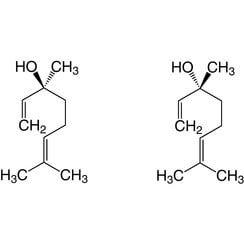You have no items in your shopping cart
Linalool
Linalool (/lɪˈnæloʊɒl, laɪ-, -loʊoʊl, -ˈluːl/) refers to two enantiomers of a naturally occurring terpene alcohol found in many flowers and spice plants. These have multiple commercial applications, the majority of which are based on its pleasant scent (floral, with a touch of spiciness). It has other names such as β-linalool, linalyl alcohol, linaloyl oxide, allo-ocimenol, and 3,7-dimethyl-1,6-octadien-3-ol.
Linalool is used as a scent in 60% to 80% of perfumed hygiene products and cleaning agents including soaps, detergents, shampoos, and lotions.
It is also used as a chemical intermediate. One common downstream product of linalool is vitamin E.
In addition, linalool is used by pest professionals as a flea, fruit fly, and cockroach insecticide. It can also be used as a method of pest control for codling moths. Linalool creates a synergistic effect with the codling moth's pheromone called codlemone, which increases attraction of males.
Linalool is used in some mosquito-repellent products; however, the EPA notes that "a preliminary screen of labels for products containing linalool (as the sole active ingredient) indicates that efficacy data on file with the Agency may not support certain claims to repel mosquitos.

